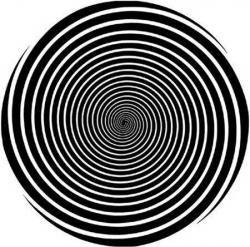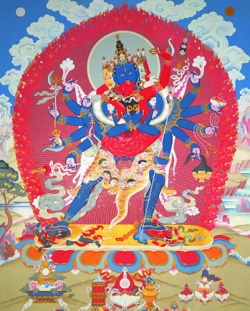Difference between revisions of "Reprint of The Buddha from Dolpo"
(Created page with "thumb|250px| <poem> The key in Dölpopa’s approach [to ultimate reality] is to link his view of the absolute as empty only of other relative phenomena...") |
m (Text replacement - "]]]" to "]])") |
||
| (One intermediate revision by one other user not shown) | |||
| Line 1: | Line 1: | ||
[[File:288099501.jpg|thumb|250px|]] | [[File:288099501.jpg|thumb|250px|]] | ||
<poem> | <poem> | ||
| − | The key in Dölpopa’s approach [to ultimate reality] is to link his view of the absolute as empty only of other relative phenomena (gzhan stong) to the teachings of the Kṛtayuga, as opposed to the teachings of the Tretāyuga and later eons that emphasize even absolute reality is empty of self-nature (rang stong). This he makes clear early in The Fourth Council: | + | The key in [[Dölpopa’s]] approach [to [[ultimate reality]]) is to link his view of the [[absolute]] as [[empty only of other]] [[relative phenomena]] ([[gzhan stong]]) to the teachings of the [[Kṛtayuga]], as opposed to the teachings of the [[Tretāyuga]] and later [[eons]] that {{Wiki|emphasize}} even [[absolute reality]] is [[empty of self-nature]] ([[rang stong]]). This he makes clear early in The [[Fourth Council]]: |
| − | Fully understanding each | + | Fully [[understanding]] each |
of those divisions, | of those divisions, | ||
| − | I wish to purge the doctrine, | + | I wish to purge the [[doctrine]], |
and wishing for myself and others | and wishing for myself and others | ||
| − | to enter the fine path, | + | to enter the fine [[path]], |
| − | I honor the sublime Kṛtayuga Dharma | + | I [[honor]] the [[sublime]] [[Kṛtayuga]] [[Dharma]] |
| − | as the witness. | + | as the {{Wiki|witness}}. |
| − | The Tretāyuga and later eons | + | The [[Tretāyuga]] and later [[eons]] |
are flawed, and their treatises | are flawed, and their treatises | ||
that have been diluted like milk | that have been diluted like milk | ||
| Line 18: | Line 18: | ||
[[File:1011.jpg|thumb|250px|]] | [[File:1011.jpg|thumb|250px|]] | ||
The higher refute the lower, | The higher refute the lower, | ||
| − | as the higher philosophical tenets | + | as the higher [[philosophical tenets]] |
refute the lower. | refute the lower. | ||
| − | The Kṛtayuga Dharma is the stainless | + | The [[Kṛtayuga]] [[Dharma]] is the stainless |
words of the Conqueror, | words of the Conqueror, | ||
| − | and what is carefully taught | + | and what is carefully [[taught]] |
| − | by the lords on the tenth level | + | by the [[lords]] on the tenth level |
and by the great system founders, | and by the great system founders, | ||
| − | flawless and endowed with sublime qualities. | + | flawless and endowed with [[sublime]] qualities. |
| − | In that tradition all is not | + | In that [[tradition]] all is not |
| − | empty of self-nature. | + | [[empty of self-nature]]. |
Carefully distinguishing | Carefully distinguishing | ||
| − | empty of self-nature and empty of other, | + | [[empty of self-nature]] and [[empty]] of other, |
| − | what is relative is all taught | + | what is [[relative]] is all [[taught]] |
| − | to be empty of self-nature, | + | to be [[empty of self-nature]], |
| − | and what is absolute is taught | + | and what is [[absolute]] is [[taught]] |
| − | to be precisely empty of other. | + | to be precisely [[empty]] of other. |
| − | Dölpopa speaks of two modes of emptiness that correspond to the two truths and to phenomena and the true nature of reality. He emphasizes that absolute truth is not empty of itself, but is the basis or ground empty of all other relative phenomena, described as the profound emptiness of other. This is the mode of emptiness for the true nature of reality. Absolute truth is uncreated and indestructible, unconditioned and beyond the chain of dependent origination. Relative truth and ordinary phenomena are empty of self-nature and completely unestablished. The relative is the created and destructible phenomena that are conditioned and dependent on causes and conditions. | + | [[Dölpopa]] speaks of two modes of [[emptiness]] that correspond to the [[two truths]] and to [[phenomena]] and the [[true nature of reality]]. He emphasizes that [[absolute truth]] is not [[empty of itself]], but is the basis or ground [[empty]] of all other [[relative phenomena]], described as the profound [[emptiness of other]]. This is the mode of [[emptiness]] for the [[true nature of reality]]. [[Absolute truth]] is uncreated and [[indestructible]], [[unconditioned]] and beyond the chain of [[dependent origination]]. [[Relative truth]] and ordinary [[phenomena]] are [[empty of self-nature]] and completely unestablished. The [[relative]] is the created and destructible [[phenomena]] that are [[conditioned]] and dependent on [[causes and conditions]]. |
</poem> | </poem> | ||
{{R}} | {{R}} | ||
[http://greatmiddleway.wordpress.com/2011/03/15/group-study-the-fourth-council/ greatmiddleway.wordpress.com] | [http://greatmiddleway.wordpress.com/2011/03/15/group-study-the-fourth-council/ greatmiddleway.wordpress.com] | ||
[[Category:Dolpopa Sherab Gyaltsen]] | [[Category:Dolpopa Sherab Gyaltsen]] | ||
Latest revision as of 17:14, 4 April 2016
The key in Dölpopa’s approach [to ultimate reality) is to link his view of the absolute as empty only of other relative phenomena (gzhan stong) to the teachings of the Kṛtayuga, as opposed to the teachings of the Tretāyuga and later eons that emphasize even absolute reality is empty of self-nature (rang stong). This he makes clear early in The Fourth Council:
Fully understanding each
of those divisions,
I wish to purge the doctrine,
and wishing for myself and others
to enter the fine path,
I honor the sublime Kṛtayuga Dharma
as the witness.
The Tretāyuga and later eons
are flawed, and their treatises
that have been diluted like milk
in the market are in every case
unfit to act as witnesses.
The higher refute the lower,
as the higher philosophical tenets
refute the lower.
The Kṛtayuga Dharma is the stainless
words of the Conqueror,
and what is carefully taught
by the lords on the tenth level
and by the great system founders,
flawless and endowed with sublime qualities.
In that tradition all is not
empty of self-nature.
Carefully distinguishing
empty of self-nature and empty of other,
what is relative is all taught
to be empty of self-nature,
and what is absolute is taught
to be precisely empty of other.
Dölpopa speaks of two modes of emptiness that correspond to the two truths and to phenomena and the true nature of reality. He emphasizes that absolute truth is not empty of itself, but is the basis or ground empty of all other relative phenomena, described as the profound emptiness of other. This is the mode of emptiness for the true nature of reality. Absolute truth is uncreated and indestructible, unconditioned and beyond the chain of dependent origination. Relative truth and ordinary phenomena are empty of self-nature and completely unestablished. The relative is the created and destructible phenomena that are conditioned and dependent on causes and conditions.

